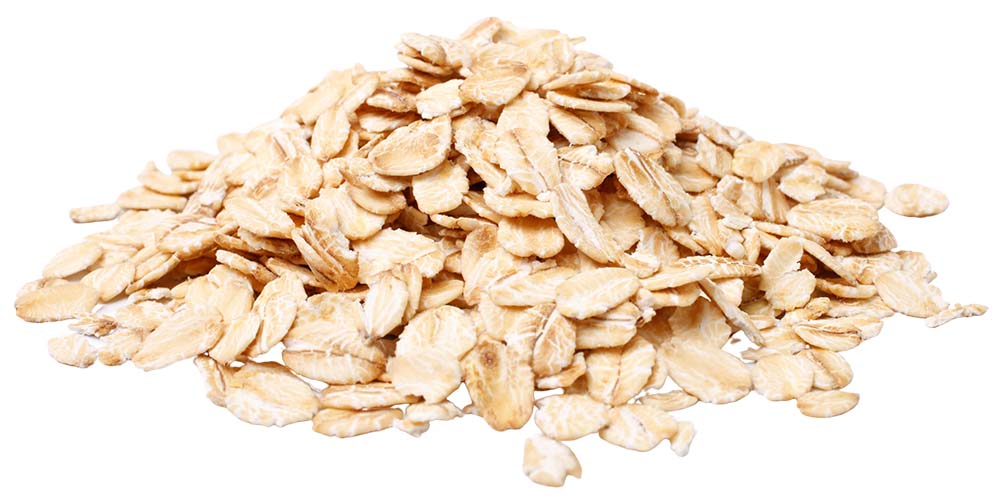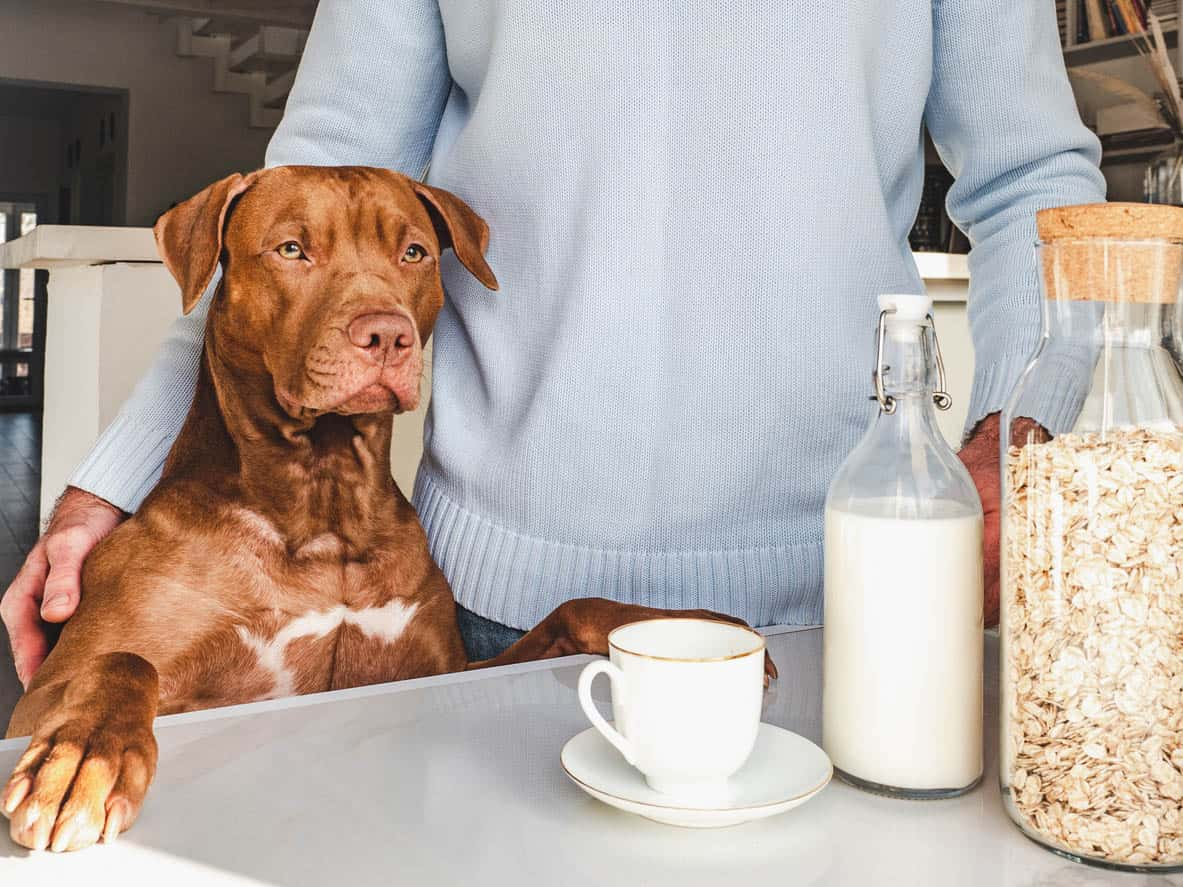Oatmeal is a healthy breakfast staple. It’s easy to prepare, and you can add nuts, fruits, cinnamon, peanut butter, and other tasty tidbits to make it delicious and add nutritional value. Does that mean you should give your furry friend oatmeal, though? You might wonder, can dogs have oatmeal? Is oatmeal good for dogs?
The answer is, “It depends.” What kind of oatmeal are you eating, and what did you put in it?
The 3 Types of Oatmeal

First, let’s define oatmeal. I’m sure you know what a stalk of corn looks like, but would you recognize oatmeal in its natural state? I don’t think I would, and I grew up in farm country.
Brittanica.com tells us oats are part of the grain family and grow tall in well-tended rows like corn plants but skinnier and smaller. The oat plant produces oat groats, which are kernels that look a little like seeds.
There are three ways of processing these groats, which gives us three types of oatmeal.
1. Steel-cut oats
These are the most minimally processed of the three. The oat “groat” is cut with a steel blade—hence the steel-cut part—and then packed for sale. Because they’re the most whole of the oatmeal family, they’re the most nutritious.
2. Rolled oats
Also called “old-fashioned” oats, rolled oats are easy to cook but undergo more processing. Instead of being cut and shipped, they’re cut and rolled flat and shipped. This extra step makes them softer than steel-cut oats, and they absorb water more easily, so they cook faster.
3. Instant oatmeal
Then there’s “instant” oatmeal. It’s probably not surprising that these packets with artificial sweeteners and flavorings are the least nutritious. Rolled like the old-fashioned variety and pre-cooked, instant oatmeal generally becomes palatable with a splash or two of boiling water.
This stuff usually has loads of added sugar and likely fewer health benefits than the other two. It’s not what you want to feed your dog.
There’s a big difference between instant oatmeal packed with sugar and artificial sweeteners like xylitol and plain steel-cut oats. Those instant packets are highly processed and filled with artificial flavorings, which reduces their nutritional value. Plus, the dangers of artificial sweeteners are real. Sweeteners like xylitol are toxic to dogs.
Now you see what “it depends” is the first answer to “Can dogs eat oatmeal?”
Is Oatmeal Good for Dogs?
Can you give your dog oatmeal, or is it bad for dogs?
Dogs eat a variety of healthy human foods as part of a balanced diet. Human foods safe for dogs include blueberries, apples, sweet potatoes, and, yes, oatmeal.
Oatmeal is packed with fiber and nutrients and can be a part of your dog’s treats. Numerous studies link oatmeal with lower risks of heart disease, cancer, and other health benefits. It’s also good for the digestive system because it’s soluble fiber.
What’s the big deal about soluble fiber? Soluble means easy to dissolve, and fiber keeps your doggo’s digestive system running well. Foods with soluble fiber may save your pup from constipation and other gastrointestinal problems.
Oats, in particular, contain beta-glucan, a type of soluble fiber that dissolves in water and coats the digestive tract. However, too much of a good thing can also cause an upset stomach, so don’t go overboard with oatmeal or any new food.
Oatmeal Nutrition
Besides oatmeal’s rich fiber content, it can fulfill other dog nutrition needs too. For example, oatmeal has linoleic acid, which is an omega-6 fatty acid that can help soothe skin by keeping it hydrated. If you’ve ever noticed the number of oatmeal-based doggie shampoos on the market for dry, itchy skin, this is why.
Then there’s magnesium, which promotes healthy muscles and nerves. Magnesium can prevent muscle spasms and help keep your pup’s bones and teeth strong. Oatmeal has B vitamins to help regulate your pup’s metabolism and antioxidants with their helpful anti-inflammatory properties.
In short, the simple oatmeal has a lot of health benefits and can fulfill some of your dog’s nutritional needs. Yet, oatmeal is high in carbohydrates, so consider your dog’s size. Is your dog a healthy weight? Then, a few extra carbs are probably fine. But if your pooch is already overweight, then you might want to skip the oatmeal or oatmeal cookies.
Now that you know your dog can have oatmeal, how much oatmeal can he have?
How Much Oatmeal Can Dogs Eat Safely?
As with any new food, it’s wise to only give a little at first.
A spoonful of cooled cooked oatmeal is plenty for your pup. If your dog were to gobble down an entire bowl of oatmeal, that could be an upset stomach waiting to happen or cause dangerous bloat.
While plain, cooked oatmeal is safe for dogs in small quantities let’s quantify a small quantity. The AKC recommends one tablespoon per twenty pounds. So, if you have a teacup poodle that weighs five pounds, that might be a ¼ a teaspoon of oatmeal. A bigger dog can have more, but you don’t want to go overboard.
How Do You Prepare Oatmeal for Your Dog?

You can prepare a little plain oatmeal with water, as many dogs don’t do well with lactose. Serve it at room temperature after you cook oatmeal so your pup doesn’t burn his tongue. Plain, room temperature oatmeal might sound bland to you and me, but I think we can agree our dogs have different standards for what they’ll put in their mouths.
Don’t feed your dog raw oatmeal because it’s more difficult to digest. For one, dogs tend to gulp their food rather than chew it. When have you last seen your pup savor their dinner?
For another, raw oats have more insoluble fiber, which can lead to bloating. Dog belly bloating is a potentially dangerous condition known as gastric dilation-volvulus (GDV) when the stomach can twist and require expensive surgery. Dog bloat can be caused by eating too much too fast.
Oatmeal for Dogs Risk Factors
For all the health benefits of cooked oatmeal served plain, it’s still a high-carb food and doesn’t meet all your pooch’s nutritional requirements. A high-quality commercial pet food is your best option for nutrition.
Dogs can eat many human foods; with the right nutritional balance, they can even be part of your dog’s diet. A well-balanced dog food has the right balance of carbs, proteins, and healthy fats for your dog’s age and activity level. Fresh ingredients make up our researched-backed pet food and ensure your furry friend has a delicious and balanced diet to maintain a healthy body weight.
This content is for informational use only and does not replace professional nutrition and/or medical advice, diagnosis, or treatment. It is not a substitute for and should not be relied upon for specific nutrition and/or medical recommendations. Please talk with your veterinarian about any questions or concerns.
Citations
Rasane, Prasad, Alok Jha, Latha Sabikhi, Arvind Kumar, and V. S. Unnikrishnan. 2013. “Nutritional Advantages of Oats and Opportunities for Its Processing as Value Added Foods – a Review.” Journal of Food Science and Technology 52 (2): 662–75. https://doi.org/10.1007/s13197-013-1072-1.
